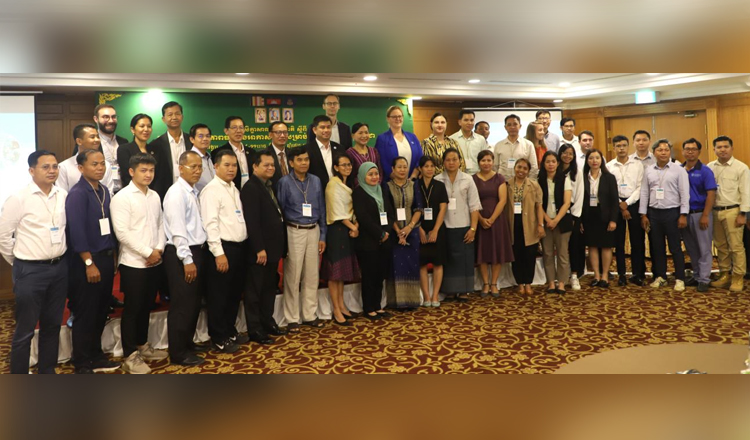
Investments in sustainable crop technologies and climate-resilient livestock production in the Northwest, as well as forest restoration and plantation in the East, have the potential to transform Cambodia’s agriculture.
FAO, in partnership with the Ministry of Environment and the Ministry of Agriculture, Forestry and Fisheries, welcomed government experts, civil society leaders, agrifood entrepreneurs, and researchers to a participatory foresight workshop on the future of agriculture, generously supported by the Green Climate Fund (GCF).
By collectively identifying provinces and agricultural sub-sectors with transformative potential, and initiating collaborative projects, the participants at the workshop paved the way for future-proof climate investments in agriculture in Cambodia. This inclusive approach not only demonstrates the value of each stakeholder’s contribution but also underscores the importance of their involvement in creating a more efficient, resilient, and sustainable agriculture sector. The projects initiated also aim to significantly enhance the resilience of smallholder farmers and agri-micro, small and medium enterprises (MSMEs) to extreme weather events, including flooding and drought.
Financing Cambodia’s agriculture ambitions for the most vulnerable
Cambodia is significantly impacted by climate change, with the level of vulnerability varying across different regions.
For instance, Battambang, Banteay Meanchey, Kampong Thom, Pursat, and Prey Veng are the top five provinces experiencing the highest losses and damages in the agricultural sector, as per FAO’s research in Cambodia. The diverse agroecological zones and socioeconomic conditions further amplify these vulnerabilities, necessitating immediate and increased climate finance for marginalized communities. This urgent situation calls for a collective responsibility to address climate change and its impacts on agriculture.
Thy Sum, Acting Director General of the General Directorate of Policy and Strategy and Tertiary GCF Focal Point of the Ministry of Environment, reiterated the high risk faced by smallholder farmers, Indigenous Peoples, and local communities due to changes in growing conditions and potential climate hazards. His Excellency emphasized, “Effective, inclusive, and multilateral action is the key to tackling climate change. On behalf of the Nationally Designated Authority (NDA), I reaffirm our unwavering commitment to working together with all stakeholders to enhance our interventions and actions, striving towards a sustainable planet and healthy people.” This strong commitment from the government and stakeholders inspires confidence in the audience about the collective efforts being made to address climate change in the agriculture sector.
The government has put robust policy frameworks in place to address the impact of climate change on agrifood systems, including its nationally determined contribution (NDC), Pentagonal Strategy, National Strategic Plan on Green Growth 2013-2030, Long-term Strategy for Carbon Neutrality (LTS4CN), Cambodia Climate Change Priority Action Plan (CCPAP) 2023-2030, and the Circular Strategy on Environment 2023-2028. However, mobilizing finance to implement these plans will not be easy – under the NDC alone, adaptation actions will require over $2 billion.
Chan Phaloeun, Under Secretary of State and the Chair of the Technical Working Group on Climate Change, Agriculture, Forestry and Fisheries of the Ministry of Agriculture, Forestry and Fisheries underlined that the agriculture sector in Cambodia, particularly smallholder farmers and MSMEs, is facing a widening finance gap. Her Excellency said: “Together, we can unlock funding and redirect agriculture and climate finance towards those who need it the most: local communities, Indigenous Peoples, youth, and women.” FAO Cambodia
Source:Khmer Times
Share: